考研英语阅读理解真题常见短语总结-毙考题
2021考研英语阅读真题:考研英语(一)第3篇 - 毙考题
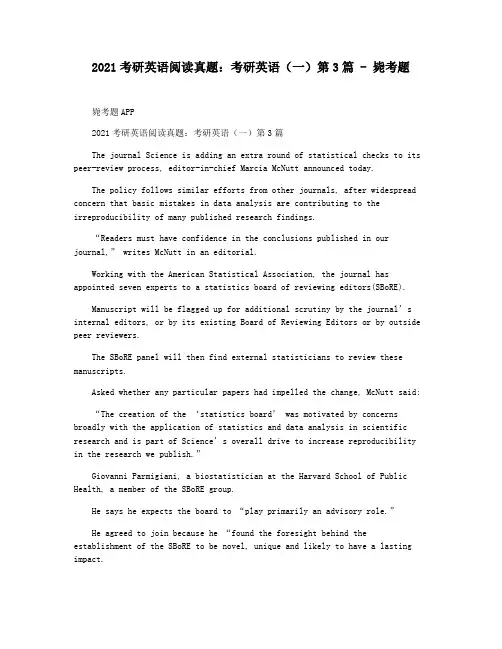
2021考研英语阅读真题:考研英语(一)第3篇 - 毙考题毙考题APP2021考研英语阅读真题:考研英语(一)第3篇The journal Science is adding an extra round of statistical checks to its peer-review process, editor-in-chief Marcia McNutt announced today.The policy follows similar efforts from other journals, after widespread concern that basic mistakes in data analysis are contributing to the irreproducibility of many published research findings.“Readers must have confidence in the conclusions pu blished in our journal,” writes McNutt in an editorial.Working with the American Statistical Association, the journal has appointed seven experts to a statistics board of reviewing editors(SBoRE).Manuscript will be flagged up for additional scrut iny by the journal’s internal editors, or by its existing Board of Reviewing Editors or by outside peer reviewers.The SBoRE panel will then find external statisticians to review these manuscripts.Asked whether any particular papers had impelled the change, McNutt said:“The creation of the ‘statistics board’ was motivated by concerns broadly with the application of statistics and data analysis in scientific research and is part of Science’s overall drive to increase reproducibility in the rese arch we publish.”Giovanni Parmigiani, a biostatistician at the Harvard School of Public Health, a member of the SBoRE group.He says he expects the board to “play primarily an advisory role.”He agreed to join because he “found the foresight b ehind the establishment of the SBoRE to be novel, unique and likely to have a lasting impact.考试使用毙考题,不用再报培训班邀请码:8806毙考题APPThis impact will not only be through the publications in Science itself, but hopefully through a larger group of publishing places that may want to model their approach after Science.”John Ioannidis, a physician who studies research methodology, says that the policy is “a most welcome step forward” and “long overdue.”“Most journals are weak in stat istical review, and this damages the quality of what they publish.I think that, for the majority of scientific papers nowadays, statistical review is more essential than expert review,” he says.But he noted that biomedical journals such as Annals of Internal Medicine, the Journal of the American Medical Association and The Lancet pay strong attention to statistical review.Professional scientists are expected to know how to analyze data, but statistical errors are alarmingly common in published research, according to David Vaux, a cell biologist.Researchers should improve their standards, he wrote in 2021, but journals should also take a tougher line, “engaging reviewers who are statistically literate and editors who can verify the process”.Vaux says that Science’s idea to pass some papers to statisticians “has some merit,but a weakness is that it relies on the board of reviewing editors to identify ‘the papers that need scrutiny’ in the first place”.总主编马西娅・麦克娜特今天宣布:《科学》杂志在同行评阅之外又增加一轮数据审查。
考研英语阅读材料汇编之科技类(2)-毙考题
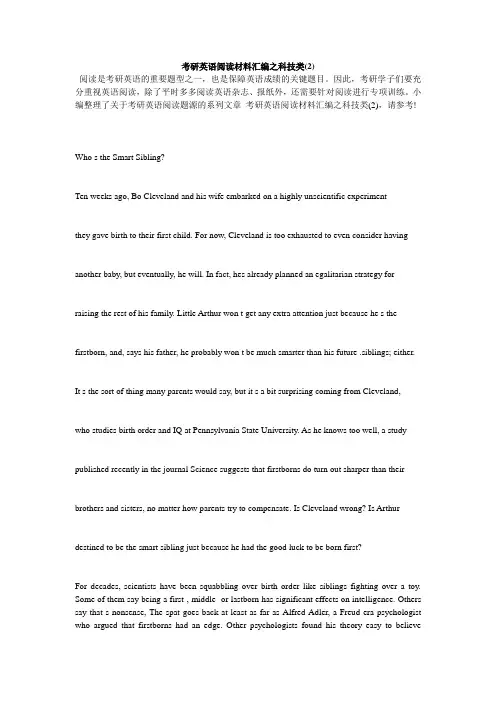
考研英语阅读材料汇编之科技类(2)阅读是考研英语的重要题型之一,也是保障英语成绩的关键题目。
因此,考研学子们要充分重视英语阅读,除了平时多多阅读英语杂志、报纸外,还需要针对阅读进行专项训练。
小编整理了关于考研英语阅读题源的系列文章考研英语阅读材料汇编之科技类(2),请参考!Who s the Smart Sibling?Ten weeks ago, Bo Cleveland and his wife embarked on a highly unscientific experiment-they gave birth to their first child. For now, Cleveland is too exhausted to even consider having another baby, but eventually, he will. In fact, hes already planned an egalitarian strategy for raising the rest of his family. Little Arthur won t get any extra attention just because he s the firstborn, and, says his father, he probably won t be much smarter than his future .siblings; either. It s the sort of thing many parents would say, but it s a bit surprising coming from Cleveland,who studies birth order and IQ at Pennsylvania State University. As he knows too well, a study published recently in the journal Science suggests that firstborns do turn out sharper than their brothers and sisters, no matter how parents try to compensate. Is Cleveland wrong? Is Arthur destined to be the smart sibling just because he had the good luck to be born first?For decades, scientists have been squabbling over birth order like siblings fighting over a toy. Some of them say being a first-, middle- or lastborn has significant effects on intelligence. Others say that s nonsense, The spat goes back at least as far as Alfred Adler, a Freud-era psychologist who argued that firstborns had an edge. Other psychologists found his theory easy to believemiddle and youngest kids already had a bad rap, thanks to everything from primogeniture laws to the Prodigal Son. When they set out to confirm the birth-order effects Adler had predicted, they found some evidence. Dozens of studies over the next several decades showed small differences in IQ; scholastic-aptitude tests and other measures of achievement So did anecdata suggesting that firstborns were more likely to win Nobel Prizes or become (ahem) prominent psychologists.But even though the scientists were turning up birth-order patterns easily, they couldn tpin down a cause. Perhaps, one theory went, the mother s body was somehow attacking the lateroffspring in uterus. Maternal antibody levels do increase with each successive pregnancy. Butthere s no evidence that this leads to differences in intelligence, and the new study in Silence,based on records from nearly a quarter of a million young Norwegian men, strikes down theantibody hypothesis. It looks at kids who are the eldest by accident-those whose older siblingsdie in infancy--as well as those who are true firstborns. Both groups rack up the same highscores on IQ tests. Whatever is lowering the latterborns scores, it isn t prenatal biology, sincebeing raised as the firstborn, not actually being the firstborn, is what counts.The obvious culprits on the nurture side are parents. But it s hard to think that favoritism toward firstborns exists in modem society. Most of us no longer view secondborn as second best, and few parents will admit to treating their kids differently. In surveys, they generally say they give their children equal attention. Kids concur, reporting that they feel they re treated fairly.Maybe, then, the problem with latterborns isn t nature or nurture-maybe there simply isn t a problem. Not all the research shows a difference in intelligence. A pivotal 2000 study by Joe Rodgers ,now a professor emeritus at the University of Oklahoma, found no link between birth order and smarts. And an earlier study of American families found that the youngest kids, not theoldest, did best in school. From that work, say psychologist Judith Rich Harris, a prominent critic of birth-order patterns, it s clear that the impression that the firstborn is more often the academic achiever is false.Meanwhile, many of the studies showing a birth-order pattern in IQ have a big, fat,methodological flaw. The Norwegian Science study is an example, says Cleveland: It scomparing Bill, the first child in one family; to Bob, the second child in another family. Thatwould be fine if all families were identical, but of course they aren t. The study controls forvariables such as parental education and family size. But Rodgers, the Oklahoma professor,notes that there are hundreds of other factors in play; and because it s so hard to discountall of them, he s not sure whether the patterns in the Science article are real.No one is more sensitive to that criticism than the Norwegian scientists. In fact, theyalready have an answer ready in the form of a second paper. Soon to be published in thejournal Intelligence, it s, similar to the Science study except for one big thing: instead ofcomparing Bill to Bob, it compares Bill to younger brothers Barry and Barney. The samebirth- order pattern shows up: the firstborns, on average, score about two points higher thantheir secondborn brothers, and hapless thirdborns do even worse. The purpose of thetwo papers was exactly the same, says Petter Kristensen of Norway s National Instituteof Occupational Health, who led both new studies. But this second one is much more comprehensive, and in a sense it s better than the Science paper. The data are there--within families, birth order really does seem linked to brain power. Even the critics have to soften their positions a little. The Intelligence study must be taken very seriously says Rodgers.No one, not even Kristensen, thinks the debate is over For one thing, there s still that argument about what s causing birth-order effects. It s possible, says UC Berkeley researcher Frank Sulloway, that trying .to treat kids in an evenhanded way in fact results in inequity. Well-meaning parents may end up shortchanging middleborns because there s one thing they can t equalize: at no point in the middle child s life does he get to be the only kid inthe house. Alternatively, says Sulloway; there s the theory he has his money on, the family- niche hypothesis Older kids, whether out of desire or necessity axe often called on to be assistant parents, he notes. Getting that early- taste of responsibility may prime them for achievement later on. If they think Oh, I m supposed to be more intelligent so I d betterdo my homework, it doesn t matter if they actually are more-intelligent, says Sulloway, Itbecomes a self-fulfilling prophecy. If the firstborns homework involves reading Science and Intelligence, there ll be no stopping them now.词汇注解重点单词embark / im ba:k/【文中释义】v.着手,从事【大纲全义】v. (使)上船(或飞机,汽车等):着手,从事extra / ekstr /【文中释义】adj.额外的【大纲全义】adj额外的,附加的n.附加物,额外的东西adv.特别地compensate / kɔmpənseit/【文中释义】v.补偿,弥补【大纲全义】v.(for)补偿,赔偿,抵消nonsense / nɔnsəns/【文中释义】n.荒谬的言行,胡话【大纲全义】n.胡说,废话;冒失(或轻浮)的行为rap / r p/【文中释义】n.不公正的判决,苛评【大纲全义】n.叩击,轻拍,斤责,急敲(声);不公正的判决,苛评,v. 敲,拍,打,斤责,使着迷predict / pri dikt/【文中释义】v.预言【大纲全义】v.预言,预测,预告prominent / prɔminənt/【文中释义】adj杰出的【大纲全义】adj.突起的,凸出的;突出的,杰出的offspring /ɔfspriŋ; (us) ɔ:f-/【文中释义】n..子孙,后代【大纲全义】n. 子孙,后代,结果,产物;(动物的)崽successive /sək sesiv/【文中释义】adj.连续的【大纲全义】adj.接连的,连续的pregnancy / Pregnənsi/【文中释义】n.怀孕【大纲全义】n.妊振;怀孕(期);(事件等的)酝酿;(内容)充实,富有意义nurture / nə: tʃə/【文中释义】n.养育,教育【大纲全义】n.营养品;养育,培养,滋养v. 给予营养物,养育,培养,滋养超纲单词egalitarian n. 平等主义sibling n. 兄弟妞妹squabble v. 为争吵spat n. 争吵primogeniture n. 长子身份aptitude n. 才能,资质anecdata n. 二逸事证据prenatal adj. 产前的,出生前的重点段落译文两周前,伯克利夫兰和他的妻子进行了一项非常不科学的实验他们生下了他们的第一个孩子。
2013考研英语阅读真题:考研英语(二)第1篇-毙考题
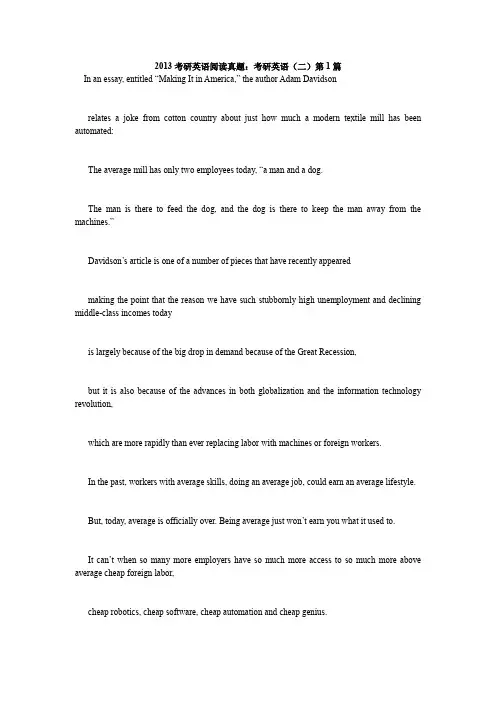
2013考研英语阅读真题:考研英语(二)第1篇In an essay, entitled “Making It in America,” the author Adam Davidsonrelates a joke from cotton country about just how much a modern textile mill has been automated:The average mill has only two employees today, “a man and a dog.The man is there to feed the dog, and the dog is there to keep the man away from the machines.”Davidson’s article is one of a number of pieces that have recently appearedmaking the point that the reason we have such stubbornly high unemployment and declining middle-class incomes todayis largely because of the big drop in demand because of the Great Recession,but it is also because of the advances in both globalization and the information technology revolution,which are more rapidly than ever replacing labor with machines or foreign workers.In the past, workers with average skills, doing an average job, could earn an average lifestyle.But, today, average is officially over. Being average just won’t ear n you what it used to.It can’t when so many more employers have so much more access to so much more above average cheap foreign labor,cheap robotics, cheap software, cheap automation and cheap genius.Therefore, everyone needs to find their extratheir unique value contribution that makes them stand out in whatever is their field of employment.Yes, new technology has been eating jobs forever, and always will.But there’s been an acceleration.As Davidson notes, “In the 10 years ending in 2009, US factories shed workers so fastthat they erased almost all the gains of the previous 70 years;roughly one out of every three manufacturing jobs--about 6 million in total--disappeared.”There will always be change —new jobs, new products, new services.But the one thing we know for sure is that with each advance in globalization and the I.T. revolution,the best jobs will require workers to have more and better education to make themselves above average.In a world where average is officially over, there are many things we need to do to support employment,but nothing would be more important than passing some kind of G.I. Bill for the 21st centurythat ensures that every American has access to post-high school education.亚当·戴维森《在美国制造》一文中提到南部种棉地区的一个笑话,内容涉及现代纺织厂自动化的程度:如今的普通工厂只有两个雇员,“一个人外加一条狗。
考研英语阅读真题:考研英语(二)第篇_毙考题
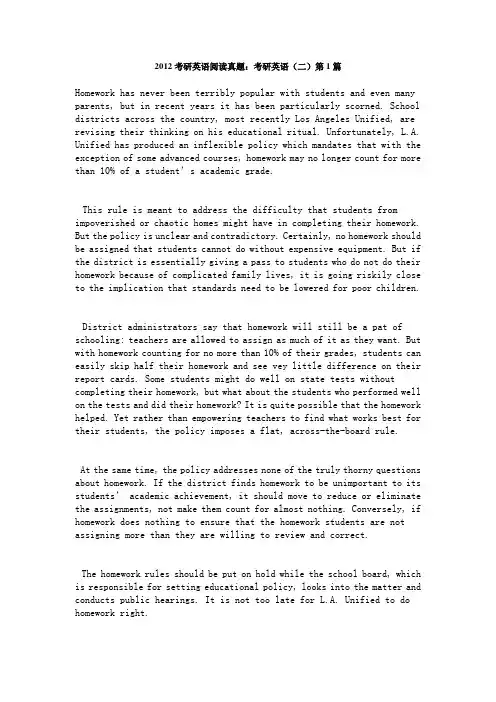
2012考研英语阅读真题:考研英语(二)第1篇Homework has never been terribly popular with students and even many parents, but in recent years it has been particularly scorned. School districts across the country, most recently Los Angeles Unified, are revising their thinking on his educational ritual. Unfortunately, L.A. Unified has produced an inflexible policy which mandates that with the exception of some advanced courses, homework may no longer count for more than 10% of a student’s academic grade.This rule is meant to address the difficulty that students from impoverished or chaotic homes might have in completing their homework. But the policy is unclear and contradictory. Certainly, no homework should be assigned that students cannot do without expensive equipment. But if the district is essentially giving a pass to students who do not do their homework because of complicated family lives, it is going riskily close to the implication that standards need to be lowered for poor children.District administrators say that homework will still be a pat of schooling: teachers are allowed to assign as much of it as they want. But with homework counting for no more than 10% of their grades, students can easily skip half their homework and see vey little difference on their report cards. Some students might do well on state tests without completing their homework, but what about the students who performed well on the tests and did their homework? It is quite possible that the homework helped. Yet rather than empowering teachers to find what works best for their students, the policy imposes a flat, across-the-board rule.At the same time, the policy addresses none of the truly thorny questions about homework. If the district finds homework to be unimportant to its stude nts’ academic achievement, it should move to reduce or eliminate the assignments, not make them count for almost nothing. Conversely, if homework does nothing to ensure that the homework students are not assigning more than they are willing to review and correct.The homework rules should be put on hold while the school board, which is responsible for setting educational policy, looks into the matter and conducts public hearings. It is not too late for L.A. Unified to do homework right.家庭作业从来就没有受到学生甚至家长的真正欢迎,但最近几年来,家庭作业却受到人们的鄙视。
2016考研英语阅读真题:考研英语(一)第4篇-毙考题
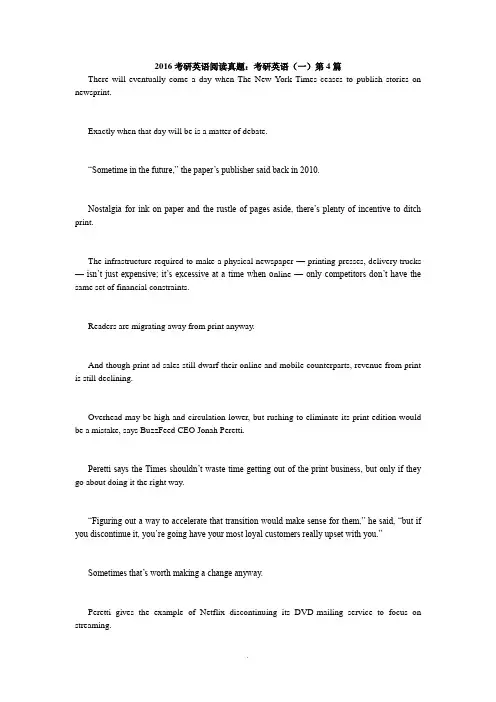
2016考研英语阅读真题:考研英语(一)第4篇There will eventually come a day when The New York Times ceases to publish stories on newsprint.Exactly when that day will be is a matter of debate.“Sometime in the future,” the paper’s publisher said back in 2010.Nostalgia for ink on paper and the rustle of pages aside, there’s plenty of incentive to ditch print.The infrastructure required to make a physical newspaper — printing presses, delivery trucks —isn’t just expensive; it’s excessive at a time when o nline —only competitors don’t have the same set of financial constraints.Readers are migrating away from print anyway.And though print ad sales still dwarf their online and mobile counterparts, revenue from print is still declining.Overhead may be high and circulation lower, but rushing to eliminate its print edition would be a mistake, says BuzzFeed CEO Jonah Peretti.Peretti says the Times shouldn’t waste time getting out of the print business, but only if they go about doing it the right way.“Figuring out a way to accelerate that transition would make sense for them,” he said, “but if you discontinue it, you’re going have your most loyal customers really upset with you.”Sometimes that’s worth making a change anyway.Peretti gives the example of Netflix discontinuing its DVD-mailing service to focus on streaming.“It was seen as blunder,” he said.The move turned out to be foresighted.And if Peretti were in charge at the Times?“I wouldn’t pick a year to end print,” he said “I would raise prices and make it into more of a legacy product.”The most loyal customers would still get the product they favor, the idea goes, and they’d feel like they were helping sustain the quality of something they believe in.“So if you’re overpaying for print, you could feel like you were helping,” Peretti said.“Then increase it at a higher rate each year and essentially try to generate additional revenue.”In other words, if you’re going to make a print product, make it for the people who are already obsessed with it.Which may be what the Times is doing already.Getting the print edition seven days a week costs nearly $500 a year — more than twice as much as a digital — only subscription.“It’s a really hard thing to do and it’s a tremendous luxury that BuzzFeed doesn’t have a legacy business,” Peretti remarked.“But we’re going to have questions like that where we have things we’re doing that don’t make sense when the market changes and the world changes.In those situations, it’s better to be more aggressive that less aggressive.”终有那么一天,《纽约时报》会停止在报纸上出版新闻报道。
2013考研英语阅读真题:考研英语(二)第3篇_毙考题
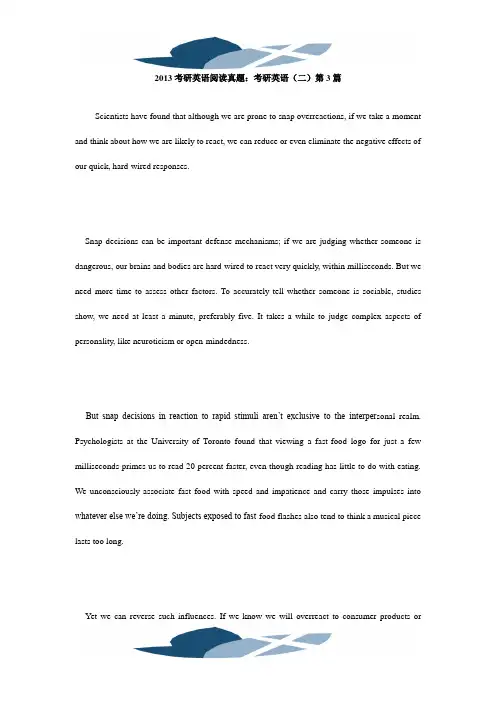
2013考研英语阅读真题:考研英语(二)第3篇Scientists have found that although we are prone to snap overreactions, if we take a moment and think about how we are likely to react, we can reduce or even eliminate the negative effects of our quick, hard-wired responses.Snap decisions can be important defense mechanisms; if we are judging whether someone is dangerous, our brains and bodies are hard-wired to react very quickly, within milliseconds. But we need more time to assess other factors. To accurately tell whether someone is sociable, studies show, we need at least a minute, preferably five. It takes a while to judge complex aspects of personality, like neuroticism or open-mindedness.But snap decisions in reaction to rapid stimuli aren’t exclusive to the interper sonal realm. Psychologists at the University of Toronto found that viewing a fast-food logo for just a few milliseconds primes us to read 20 percent faster, even though reading has little to do with eating. We unconsciously associate fast food with speed and impatience and carry those impulses into whatever else we’re doing. Subjects exposed to fast-food flashes also tend to think a musical piece lasts too long.Yet we can reverse such influences. If we know we will overreact to consumer products orhousing options when we see a happy face (one reason good sales representatives and real estate agents are always smiling), we can take a moment before buying. If we know female job screeners are more likely to reject attractive female applicants, we can help screeners understand their biases-or hire outside screeners.John Gottman, the marriage expert, explains that we quickly “thin slice” information reliably only after we ground such snap reactions in “thick sliced” long-term study. When Dr. Gottman really wants to assess whether a couple will stay together, he invites them to his island retreat for a much longer evaluation; two days, not two seconds.Our ability to mute our hard-wired reactions by pausing is what differentiates us from animals: dogs can think about the future only intermittently or for a few minutes. But historically we have spent about 12 percent of our days contemplating the longer term. Although technology might change the way we react, it hasn’t changed our nature. We still ha ve the imaginative capacity to rise above temptation and reverse the high-speed trend.科学家已经发现:虽然我们易于快速地做出过度反应,但是如果我们花点时间考虑一下我们可能做出的反应,就可以减少,甚至是消除我们快速、本能的反应所带来的消极影响。
考研英语:长难句解析(57)_毙考题
2019考研英语:长难句解析(57)( 2011年真题Section ⅡReading Comprehension Part A Text3 第1段第1句)We tend to think of the decades immediately following World War II as a time of prosperity and Growth, with soldiers returning home by the millions, going off to college on the G. I. Bill and lining up at the marriage bureaus.译文:我们往往把二战后的几十年视作繁荣和发展的时代,数以百万计的士兵回到家乡,靠着政府对退役军人的资助读大学或在婚姻登记处排队办理结婚手续。
分析:本句的主语是We,谓语是tend to think of,宾语是the decades,由as引导的介词短语是该宾语的补足语。
decades 后面的现在分词短语immediately following 做后置定语修饰decades ,time后的介词短语of 则是修饰time的后置定语。
本句的第二部分是with引导的伴随状语,该伴随状语由with soldiers returning ,going and lining 组成。
本句的难点在于对think of as 这一结构以及伴随状语中三个并列部分的理解。
词汇指南tend [tend](v.)走向,趋向;倾向;照料,看护(CET-4)(t=to-去,end-末端,尽头朝末端去、伸展即走向,趋向,引申为倾向;照料,看护。
)考点搭配:tend to 倾向于(2008年-阅读1)1个派生词:●tendency [ tendənsi](n.)趋势,趋向;倾向(CET-4)(2010年-阅读3)(ency-名词后缀)marriage[ m ridʒ](n.)结婚,婚姻;婚礼(中考词汇)(marri=marry-结婚,age-抽象名词后缀结婚,婚姻;婚礼)3个扩展词:●marry [ m ri](vt.)娶,嫁(vi.)结婚(中考词汇)(2006年-阅读1)(mar=march-三月,r-双写,y-名词后缀西方白色情人节(White Day),定于3月14日,该节日源于欧洲,于20世纪70年代被日本人所接受并广泛流传,也是西方情人节的延续,最早起源于三世纪时的罗马。
2019考研英语语法解析:no more与not more.+than 用法_毙考题
毙考题APP2019考研英语语法解析:no more与not more.+than 用法no more(...)than与not more(...)than 的用法在阅读理解里面,我们经常会遇到自己认为熟悉短语,于是便按照字面意思去理解。
实际上,在英语里面有很多短语都有其约定俗成的用法和意思,不能按其字面意思去理解,象这样的短语有很多,这里先把大家觉得比较头疼的no more(...)than与not more(...)than 的用法先解释清楚,希望对大家有所帮助:(1)不用于比较,后接数词时,no more than意为仅仅,只不过,只有(=only),而not more than意为至多,不超过(=at the most).eg:There are no more than fifteen eggs in the basket.篮子里只有15个鸡蛋。
(暗指15个鸡蛋太少)eg:There are not more than fifteen eggs in the basket.篮子里至多有15个鸡蛋。
(暗指可能少于15个)(2)用语两者的比较时:no+形容词或副词比较级+than 是对两者的否定,相当于neither...nor...eg:This story is no more interesting than that one.(=Neither this story nor that one is interesting.)这个故事和那个故事一样没趣。
not+形容词或副词比较级+than 是普通的比较级结构,表示前者不如后者,相当于not so...as...eg:This story is not more interesting than that one.(=This story is not so interesting as that one.)考试使用毙考题,不用再报培训班邀请码:8806。
2013考研英语阅读真题:考研英语(二)第4篇-毙考题
2013考研英语阅读真题:考研英语(二)第4篇-毙考题DBut, when one considers the obstacles to achieving the meritocratic ideal,it does look as if a fairer world must be temporarily ordered.After all, four decades of evidence has now shown thatcorporations in Europe as well as the US are evading the meritocratic hiring and promotion of women to top positionno matter how much “soft pressure” is put upon them.When women do break through to the summit of corporate power —as, for example, Sheryl Sandberg recently did at Facebookthey attract massive attention precisely because they remain the exception to the rule.If appropriate pubic policies were in place to help all women---whether CEOs or their children’s caregivers--and all families,Sandberg would be no more newsworthy than any other highly capable person living in a more just society.欧洲并不是男女平等的天堂。
历年考研英语真题中的熟词僻义解读:discipline_毙考题
下载毙考题APP免费领取考试干货资料,还有资料商城等你入驻邀请码:8806 可获得更多福利历年考研英语真题中的熟词僻义解读:discipline熟词僻义是考研英语对词汇考察的一种形式,所以考生在背单词的时候不要只注意常用意思,要把多重意义都熟悉理解。
小编整理了历年真题中出现的熟词僻义单词,很有可能会再考到,大家抓紧看:历年考研英语真题中的熟词僻义解读:disciplinediscipline n.①纪律;②学科;③训练,训导;④惩罚,处罚;vt.①训练,训导;②惩罚,约束【真题例句】(72) Interest in historical methods has arisen less through external challenge to the validity of history as an intellectual discipline (n.②) and more from internal quarrels among historians themselves.[1999年翻译]【例句精译】(72) 人们之所以关注历史研究的方法论,主要是因为史学界内部意见不一,其次是因为外界并不认为历史是一门学问。
【真题例句】As a member of a British commission visiting here in 1853 reported, With a mind prepared by thorough school discipline (n.③), the American boy develops rapidly into the skilled workman. [1996年阅读4] 【例句精译】正如1853年访美的一个英国访问团成员所报道的那样,由于有了学校彻底训练过的头脑,美国孩子迅速地成为技术熟练的工人。
【真题例句】The cruel discipline (n.④) of the strike and lockout taught the two parties to respect each other’s strength and understand the value of fair negotiation.[1996年阅读3]【例句精译】罢工和封厂的无情惩罚使双方学会了互相尊重对方的力量,理解公正谈判的价值。
- 1、下载文档前请自行甄别文档内容的完整性,平台不提供额外的编辑、内容补充、找答案等附加服务。
- 2、"仅部分预览"的文档,不可在线预览部分如存在完整性等问题,可反馈申请退款(可完整预览的文档不适用该条件!)。
- 3、如文档侵犯您的权益,请联系客服反馈,我们会尽快为您处理(人工客服工作时间:9:00-18:30)。
考研英语阅读理解真题常见短语总结
1. abide by(=be faithful to ; obey)忠于;遵守。
2. be absent from…. 缺席,不在
3. absence or mind(=being absent-minded) 心不在焉
4. absorb(=take up the attention of)吸引…的注意力(被动语态):be absorbed in 全神贯注于…近:be engrossed in ; be lost in ; be rapt in ;be concentrated on ; be focused on ; be centered on
5. (be) abundant in(be rich in; be well supplied with) 富于,富有
6. access(to) (不可数名词) 能接近,进入,了解
7. by accident(=by chance, accidentally)偶然地,意外. Without accident(=safely) 安全地,
8. of one’s own accord(=without being asked; willingly; freely)自愿地,主动地
9. in accord with 与…一致. out of one’s accord with 同….不一致
10. with one accord (=with everybody agreeing)一致地
11. in accordance with (=in agreement with) 依照,根据
12. on one’s own account 1) 为了某人的缘故, 为了某人自己的利益2)(=at one’s own risk) 自行负责3)(=by oneself)依靠自己on account 赊账; on account of 因为; on no account不论什么原因也不;of …account 有…..重要性.
13. take…into account(=consider)把...考虑进去
14. give sb. an account of 说明, 解释(理由)
15. account for (=give an explanation or reason for) 解释, 说明.
16. on account of (=because of) 由于,因为.
17. on no account(=in no case, for no reason)绝不要,无论如何不要(放句首时句子要倒装)
18. accuse…of…(=charge…with; blame sb. for sth. ; blame sth. on sb. ; complain about) 指控,控告
19. be accustomed to (=be in the habit of, be used to)习惯于.
20. be acquainted with(=to have knowledge of) 了解; (=to have met socially) 熟悉
21. act on 奉行,按照…行动; act as 扮演; act for 代理
22. adapt oneself to(=adjust oneself to) 使自己适应于
23. adapt…(for) (=make sth. Suitable for a new need) 改编, 改写(以适应新的需要)
24. in addition (=besides) 此外, 又, 加之
25. in addition to(=as well as, besides, other than)除…外
26. adhere to (=abide by, conform to, comply with, cling to, insist on, persist in, observe, opinion, belief ) 粘附; 坚持, 遵循
27. adjacent(=next to, close to) 毗邻的, 临近的
28. adjust..(to) (=change slightly)调节; 适应;
29. admit of (=be capable of, leave room for) …的可能,留有…的余地.
30. in advance (before in time) 预告, 事先.
31. to advantage 有利的,使优点更加突出地.
32. have an advantage over 胜过. have the advantage of 由于…处于有利条件have the advantage of sb.知道某人所不知道的事
33. take advantage of (=make the best of, utilize, make use of, profit from, harness)利用.
34. agree with 赞同(某人意见) agree to 同意
35. in agreement (with) 同意, 一致
36. ahead of 在…之前, 超过…;……………. ahead of time 提前.
37. in the air 1)不肯定, 不具体. 2)在谣传中.
38. above all (=especially, most important of all) 尤其是, 最重要的.
39. in all (=counting everyone or everything, altogether) 总共, 总计
40. after all 毕竟,到底; (not) at all 一点也不; all at
once(=suddenly)突然; once and for all 只此一次; above all 最重要的; first of all 首先; all in all 大体上说; be all in 累极了; all but 几乎.
41. allow for (=take into consideration, take into account) 考虑到, 估计到.
42. amount to (=to be equal to) 总计, 等于.
43. answer for (undertake responsibility for, be liable for, take charge for) 对…负责.
44. answer to (=conform to) 适合,符合.
45. be anxious about 为…焦急不安; 或anxious for
46. apologize to sb. for sth. 为…向…道歉
47. appeal to sb. for sth. 为某事向某人呼吁. appeal to sb. 对某人有吸引力
48. apply to sb. for sth. 为…向…申请; apply for申请; apply to 适用.
49. apply to 与…有关;适用
50. approve of (=consent to, be in favor of, favor, agree to, consider good, right) 赞成, approve vt. 批准。
